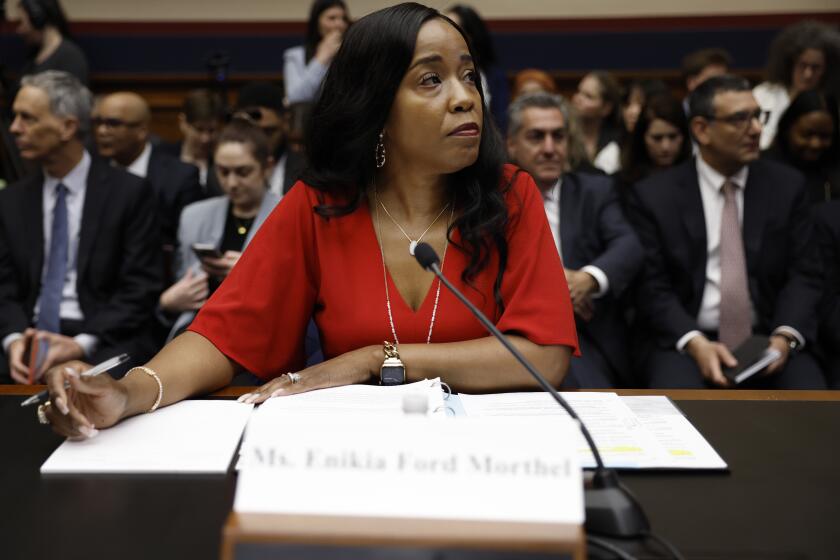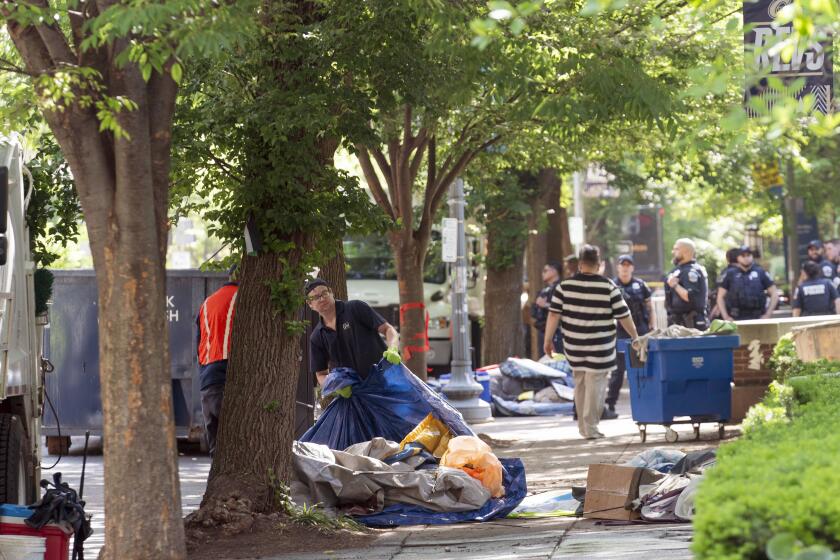USC Spends Big to Boost a Weak Academic Link
After more than 20 years as a philosophy professor at Princeton University, Scott Soames put out the word in academic circles last fall that he was ready for a change.
That was all the encouragement needed for USC, eager to snare new star faculty members, to swing into action. The school quickly flew Soames in from New Jersey for a couple of visits, told him about USC’s rising aspirations and offered a pay raise.
Finally, the Southern California climate clinched the deal. “I kind of fell in love with Los Angeles while I was out there,” said Soames, an expert in the philosophy of language. “It was December and January, and it’s easy to fall in love with then.”
At a time when many other universities are hamstrung by budget cutbacks and worried about raiding of their faculty, USC is in the midst of an ambitious hiring campaign. The Los Angeles campus is flush with money from a record-setting $2.85-billion fundraising campaign concluded a year ago, and it is using $100 million of that to snag high-profile scholars like Soames.
The hiring is for the campus’ largest division, the College of Letters, Arts and Sciences. USC leaders and others in higher education have considered it a weak link, compared with the campus’ professional schools such as engineering and law, and they hope the recruits will lift the college’s stature.
“It’s very rare that an institution can make a major move like they’re making,” said Ronald G. Ehrenberg, director of Cornell University’s Higher Education Research Institute. He noted that Northeastern University in Boston recently announced a $75-million recruiting effort, one of the few examples of another school that is planning to substantially expand its faculty, but he added that “they’re not in a position to move to the top rung, like Southern Cal is.”
Overall, USC is rated the 30th-best research university in the nation in the most recent U.S. News & World Report rankings, up from No. 42 a decade ago. That still leaves it behind several other California institutions: Stanford and Caltech were in a four-way tie for 5th place, UC Berkeley came in at 21st and archrival UCLA was 26th.
Some of USC’s professional graduate schools fared well in the magazine’s rankings -- film was tied for No. 1 in the nation, engineering was 8th, law was 18th and business was 20th. The magazine did not rate the College of Letters, Arts and Sciences separately. But academic experts say many of USC’s social sciences and humanities programs and its general intellectual atmosphere have lagged.
USC itself just suffered a major faculty loss when constitutional law scholar and civic activist Erwin Chemerinsky announced that he was heading to Duke University. Chemerinsky said he was happy with USC but that he and his wife, Catherine Fisk, also a USC law professor, wanted the smaller-town environment of North Carolina.
However, university officials say they have won far more of the recruiting battles than they have lost since the campaign was announced in September 2002. Along with Soames, new hires due to arrive for this fall or 2005 include a Caltech historian of the West, a Salk Institute molecular biologist and four humanities professors from the University of California system.
Joseph Aoun, dean of the USC college and architect of the hiring initiative, said that about half of the 100 hires anticipated in the initiative had been made.
A major part of his strategy was to find professors whose scholarly work crosses conventional academic boundaries. “The exciting discoveries are happening at the intersections of fields, and not within the traditional disciplines,” Aoun said.
As an example, he cited computational biology, a growing field that uses computers to investigate such things as the working of the brain or the immune system.
Aoun said one of his key selling points to prospective professors was the academic progress that USC is making, along with its ability and willingness to invest in new programs.
He said USC -- drawing from its endowment of $2.1 billion, ranked 21st in the nation -- was offering pay raises and in many cases temporary housing subsidies to bring in new faculty members. Still, Aoun said, he would not create a two-tier salary structure that would leave an income gap between the new and existing faculty, and he said the salary offers had not played the key role in attracting new faculty members.
In Soames’ case, personal reasons influenced the decision.
“I’m getting married this summer, and my fiancee and I thought it might be nice to look around for a new place to see if we might make a new start somewhere,” Soames said.
Soames, 58, whose works include the two-volume history “Philosophical Analysis in the Twentieth Century,” acknowledged that USC’s philosophy department was no match for Princeton’s. But he said it was very important “to try to institute a top-flight program at an institution which may have been good, but maybe not absolutely outstanding in my area. If I could help build something like that, that would be a lasting thing and another form of contribution to the discipline.”
Moving from Caltech to USC is William Deverell, 41, a historian specializing in 19th- and 20th-century California and the West. He also is chairman of the California Council for the Humanities.
Deverell said he had been drawn both by the chance to work with graduate students again -- Caltech has no doctoral program in the humanities -- and by USC’s “great strides in recent years.”
His latest book, due out this spring, is “Whitewashed Adobe: The Rise of Los Angeles and the Remaking of its Mexican Past.” It focuses on the historical tensions and ties between white Californians and those of Mexican backgrounds.
Deverell is being assigned to develop an institute teaming USC and the Huntington Library in San Marino, whose archives he has mined for much of his scholarly work. Deverell once worked at the Huntington, and his wife, Jennifer Watts, is its curator of photography.
Coming to USC as an associate professor of molecular biology is Susan L. Forsburg, 41. She currently holds a similar position at the Salk Institute in La Jolla, and also is an adjunct professor at UC San Diego.
Forsburg said she had considered other offers but had chosen USC in part because of the interdisciplinary work environment. A laboratory scientist, Forsburg said she was looking forward to working closely with computational biologists at USC.
Forsburg also cited the major investment that USC was putting into her field, including a $50-million molecular and computational biology building, due to open in the spring of 2005.
Other people hired recently include English professors John Carlos Rowe, 58, an expert in American literature from UC Irvine, and Judith Halberstam, 42, of UC San Diego, who has taught gender theory.
Another hire is philosophy scholar Jeffrey C. King, 46, of UC Davis, who, like Soames, explores language issues.
That’s welcome news for Amanda Printz, who is in the fourth year of working on her philosophy PhD at USC. “You’ll just benefit from talking to people of that caliber,” she said. Printz said high-profile professors would make her degree more marketable and also would “benefit your philosophy itself.”
USC administrators hope that the new professors also will enable the university to attract stronger undergraduates. The school says the average SAT scores of its incoming freshmen have climbed to 1341 this year, up from 1095 a decade ago.
The university’s overall recruitment strategy hasn’t been a hit with all faculty members, however. Judith Stacey, a professor of sociology and gender studies at USC for six years, said in an interview that she would leave at the end of the school year to go to New York University.
Stacey said that, while the university had poured money into areas such as history, English and economics, her field “was being kept on a diet.”
That made it hard to recruit top graduate students, she said.
Aoun disputed the claim that the sociology department was being shortchanged, pointing out that two sociologists from the University of Wisconsin had just been hired.
Patrick M. Callan, president of the nonprofit National Center for Public Policy and Higher Education in San Jose, said the USC effort might help the school if the new faculty members attracted top young scholars.
But, Callan said, such recruiting pushed up the costs of higher education.
“This year, USC gives them a big offer, but next year, somebody steals somebody else from USC. We do that with superstar faculty because of the prestige they bring,” Callan said.



